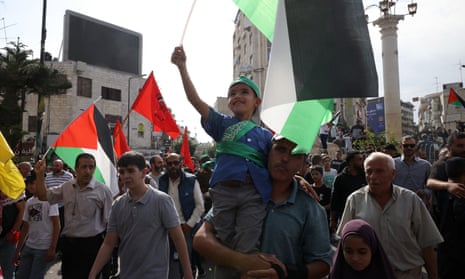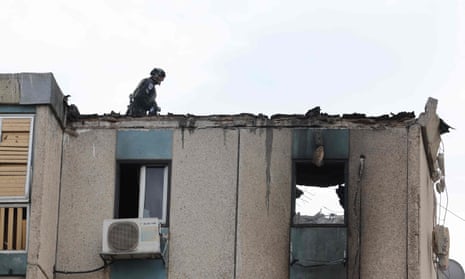Israel-Hamas war live: Gaza facing ‘massive health hazard’ as water runs low and sewage overflowing on to streets, says UN | Israel-Hamas war
Gaza’s services are crumbling and streets are overflowing with sewage, warns UNRWA
More from Philippe Lazzarini’s press conference in Jerusalem. Lazzarini is the commissioner general for UNRWA, the UN relief and works agency for Palestinian people.
“Basic services are crumbling. Medicine is running out. Food and water are running out. The streets of Gaza have started overflowing with sewage,” he told reporters. “Gaza is on the brink of a massive health hazard as the risk of diseases is looming.”
Earlier this week, Israel insisted it will not allow fuel in, arguing that Hamas had stolen fuel from the UN to use for military purposes.
Lazzarini said that UNRWA had been forced to “drastically” limit the consumption of fuel. “Our team had to make tough decisions that no humanitarian workers should do,” he said. “What needs more support? Bakeries, water station? Life support machines in the hospital? All this needs fuel to function.”
Lazzarini insisted that the agency had a “solid monitoring mechanism” in place to ensure that aid is not diverted. “UNRWA does not and will not divert any humanitarian aid into the wrong hands.”
He denied that Hamas had stolen fuel from the UN, adding: “It pains me that humanitarian aid, a very basic right for people, is constantly questioned, while at the same time despair is livestreamed on our watch.”
On 7 October, Hamas gunmen poured from Gaza into Israel, killing 1,400 people, mostly civilians, and kidnapping more than 220, according to Israeli officials.
In retaliatory Israeli air and artillery strikes, at least 7,028 people have been killed in the Gaza Strip, including 2,913 children, according to figures released by the Hamas-controlled health ministry.
On Friday Lazzarini said that 57 of the UN agency’s staff had been killed during the war.
Key events
Drone footage published by the Guardian’s video team shows people in Gaza lining up on Friday outside a United Nations Development Programme water station to fill up canisters and bottles with fresh water.
On Friday the UN warned that water is running out in Gaza.
Israel’s minister of defence, Yoav Gallant, has spoken to a small group of foreign reporters in Tel Aviv, the Associated Press reports.
Gallant said the ground offensive into Gaza will be long and difficult as it will require destroying what he described as a vast network of tunnels used by Hamas militants.
The ground invasion, he added, would lead to another phase of lower-intensity fighting, as Israel destroys ”pockets of resistance.”
His remarks came after the UN sounded the alarm over rapidly dwindling fuel supplies amid resistance by Israel to allow fuel into Gaza. Speaking to reporters, Gallant said Israel believes that Hamas would confiscate any fuel that enters.
Gallant said that Israel believes Hamas uses generators to pump air into its hundreds of kilometres of tunnels, which originate in civilian areas. He showed reporters aerial footage of what he described as a tunnel shaft built right next to a hospital.
The Associated Press noted that it was not able to independently confirm Gallant’s claims and that little is known about the use of tunnels and other infrastructure by Hamas.
Speaking earlier on Friday, Philippe Lazzarini, the commissioner general for UNRWA, the UN relief and works agency for Palestinian people, said the agency had a “solid monitoring mechanism” in place to ensure that aid is not diverted.
Earlier this week, Israel argued that Hamas had stolen fuel from the UN to use for military purposes.
“UNRWA does not and will not divert any humanitarian aid into the wrong hands,” Lazzarini insisted.

Julian Borger
Israel has had a full invasion force massed on Gaza’s borders for over a week. Its military leaders insist they are ready, and Benjamin Netanyahu has his finger on the trigger, but so far has not pulled it.
The Israeli prime minister gave a speech on Wednesday night that sounded like a rallying cry for a ground assault, but it was carefully drafted, committing to nothing specific and saying the place and manner of any attack would be “determined unanimously” by the war cabinet and the army commanders.
Whatever happens, Netanyahu – down in the polls and widely blamed for allowing the 7 October attack by Hamas to happen – is making sure he does not take sole responsibility for whatever comes next. He knows there is no unanimity in the Israeli leadership.
Earlier we reported on the American airstrikes on Iran proxies in Syria, which come amid fears that the war between Israel and Hamas could escalate into a regional conflict.
We’ve now heard from the White House national security spokesperson. Speaking to ABC’s Good Morning America, John Kirby said the strikes were targeting storage and weapons facilities and were in retaliation for a slew of drone and missile attacks against US bases and personnel in the region that began early last week.
“These strikes were in self-defence,” said Kirby, in comments reported by the Associated Press.
When asked if Iran will retaliate, Kirby said, “It’s not uncommon for them to strike back. If they do, we’ll absolutely do what we have to do to protect our troops and our facilities.”
“We’ll be ready for that,” he added.
Speaking about the Israel-Hamas war and the timing of the ground offensive announced by Israel, Kirby said that “we’re not dictating terms to” the Israelis.
But he echoed earlier comments from the US president, Joe Biden, in saying that if “we can take some time to get more hostages out, that’s something we all want to be looking at.”
In Israel, the defence minister, Yoav Gallant, said on Friday that the ground offensive into Gaza will be long and difficult, with the aim to destroy a vast network of tunnels used by the territory’s militant Hamas rulers.
Here are some of the most recent images sent to us over the news wires from Gaza, the West Bank and Israel:




At least 7,326 Palestinians, including 3,038 children, have been killed in Israeli strikes on Gaza since 7 October, the health ministry in Hamas-controlled Gaza has said. The claims have not been independently verified.
Earlier this week the US president, Joe Biden, questioned the reliability of the ministry’s reporting – because the health ministry is run by Hamas. Biden did not offer any further evidence to explain his stance.
The Gaza health ministry responded with a 212-page document listing out the names and identification numbers of thousands of Palestinians that the Hamas authorities, which control Gaza, said had been killed in the Israeli bombardment.
Omar Shakir, the Israel and Palestine director at Human Rights Watch, said he saw no evidence that the numbers were being manipulated. “We have been monitoring human rights abuses in the Gaza Strip for three decades, including several rounds of hostilities. We’ve generally found the data that comes out of the Ministry of Health to be reliable,” he said.
The war erupted on 7 October after Hamas militants stormed across the Gaza border, killing 1,400 people, mostly civilians, and taking at least 229 people hostage.
Hamas is holding ‘at least some’ of France’s nine missing nationals, says foreign minister
France’s foreign minister, Catherine Colonna, has said that at least some of the nine French citizens who have been missing since Hamas’ attack on Israel on 7 October are being held hostage.
“We have no specific news (of them) but some of them we know have been taken hostage,” Colonna said in an interview with the French radio station RTL and cited by the Associated Press.
“We demand the release of all hostages and not just French hostages,” she added.
On Thursday France’s foreign ministry said that 35 French citizens were killed in the October 7 Hamas attacks on Israel.
Hamas and other militants in Gaza are believed to have taken hostage at least 229 people, including an unconfirmed number of foreigners and dual citizens.
The Kremlin has defended its decision to invite a Hamas delegation to Moscow, Reuters reports.
Russia’s decision prompted Israeli anger, with Israel describing the invitation as “deplorable” and urging Russia to expel the delegation.
On Friday the Kremlin said Russia believes it is necessary to maintain contacts with all sides in conflict.
Kremlin spokesman Dmitry Peskov said the delegation had met with representatives of Russia’s foreign ministry but had had no contact with the Kremlin.
The Guardian’s Moscow correspondent, Andrew Roth, covered the delegation’s visit earlier this week:
The International Committee of the Red Cross has said that 10 of its experts, including a war surgery team, have entered Gaza alongside six trucks of medical aid and water purification tablets.
The medical supplies are enough to treat between 1,000 and 5,000 people while the water purification tablets can treat 50,000 litres of drinking water, it said.
“This crucial humanitarian assistance is a small dose of relief, but it’s not enough,” said Fabrizio Carboni, the ICRC’s regional director said in a statement.
The surgical team and medical supplies will help to relieve the extreme pressure on doctors and nurses in Gaza, he added. “But safe, sustained humanitarian access is urgently needed. This humanitarian catastrophe is deepening by the hour.”
Sadiq Khan adds to pressure on Keir Starmer over Israel-Hamas ceasefire

Aubrey Allegretti
Keir Starmer has come under further pressure to call for a ceasefire between Israel and Hamas, as one of Labour’s most senior Muslim politicians said it was the best way to avoid further “devastating loss of life”.
Sadiq Khan, the mayor of London, said the “terrible situation” in Gaza looked set to deteriorate further and that a “substantial military escalation” was brewing.
“I join the international community in calling for a ceasefire,” he said, arguing it would avoid more civilian casualties, allow aid to reach those in need and allow more time to avoid the conflict growing in the Middle East.
Khan said Israel had a right to defend itself, target those responsible for what he called the terror attack on 7 October and seek to free hostages, but added: “No nation, including Israel, has the right to break international law.”
Here is our full story on the second ground raid by Israeli troops into Gaza:
Fuel shortages risk worsening ‘catastrophic conditions’ in Gaza – World Food Programme
The United Nations World Food Programme has warned that just two of their contracted bakeries – compared to 23 at the start of the war – have enough fuel to produce bread at the moment.
The dwindling supply meant that “tomorrow there might be none,” WFP Representative in Palestine Samer Abdeljaber said in a statement. “This would be a terrible blow to the thousands of families living in shelters who have been relying on the daily bread deliveries.”
The lack of fuel supplies has had a ripple effect through the supply chain, as fuel is also needed for supply trucks and food distribution. WFP said essential food commodities are rapidly running out across Gaza, and about 10% of the WFP-contracted shops had already run out of supplies.
Earlier this week, Israel insisted it will not allow fuel in, arguing that Hamas had stolen fuel from the UN to use for military purposes.
The WFP’s Abdeljaber said continuous aid delivery was needed. “To ease the suffering and enable the delivery of life-saving assistance, we echo the secretary general’s appeal for a humanitarian ceasefire.”
IDF says it struck more than 250 ‘Hamas targets’ in 24 hours
In a post on social media, Israel Defense Forces said it struck a “terrorist tunnel network in Gaza” as well as eliminated the commander of Hamas’s western Khan Younis battalion.
Madhath Mubashar—Commander of Hamas’ Western Khan Yunis Battalion—was eliminated by an IDF aerial strike.
Furthermore, the IDF struck 250+ Hamas targets including a terrorist tunnel network in Gaza that detonated the secondary explosions. pic.twitter.com/qaB5J0np2G
— Israel Defense Forces (@IDF) October 27, 2023
Blasts hit two Egyptian Red Sea towns, Israel points to ‘aerial threat’
Projectiles have hit two Egyptian Red Sea towns, sources and officials told Reuters, injuring six people and laying bare the risk of regional spillover from the Israel-Hamas conflict.
Egyptian army spokesperson Colonel Gharib Abdel-Hafez said an “unidentified drone” crashed into a building adjacent to a hospital in Taba, on the border of Israel, in the early hours. Six people were injured.
Another projectile later fell near an electricity plant in a desert area of the town of Nuweiba about 70 km (43 miles) from the border, two Egyptian security sources told Reuters, adding that they were still gathering more information.
There was no claim of responsibility.
Without specifying the location, Israel’s military spokesperson Daniel Hagari said Friday that combat helicopters were scrambled when “an aerial threat was spotted in the Red Sea region”.
“To our understanding, the strike that took place in Egypt originated in this threat,” he added in a televised briefing. “Israel will work with Egypt, and the United States, and bolster regional defences against threats from the Red Sea region.”
US puts new sanctions on Hamas, members of Iran’s Revolutionary Guard
The US has issued a second round of sanctions on what it described as key Hamas-linked officials and financial networks.
The US Treasury Department linked the measures, which target assets in a Hamas investment portfolio as well as those accused of helping Hamas evade sanctions, to the attacks on 7 October.
“Today’s action underscores the United States’ commitment to dismantling Hamas’s funding networks by deploying our counterterrorism sanctions authorities and working with our global partners to deny Hamas the ability to exploit the international financial system,” the deputy secretary of the treasury, Wally Adeyemo, said in a statement.


